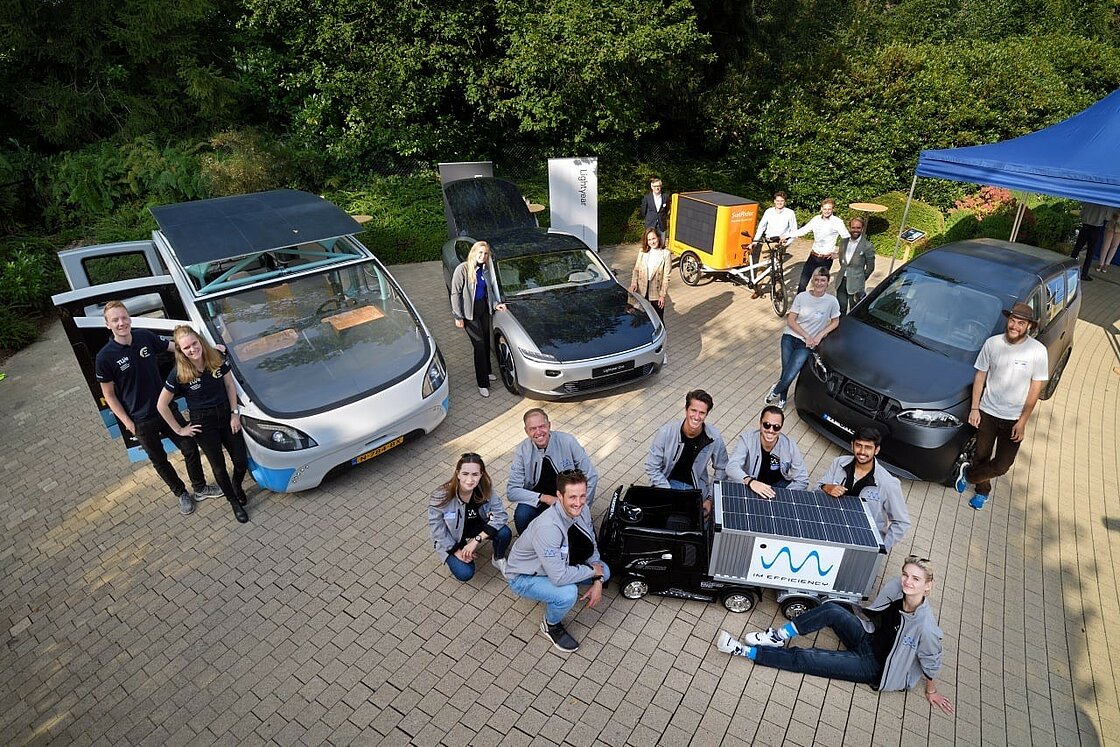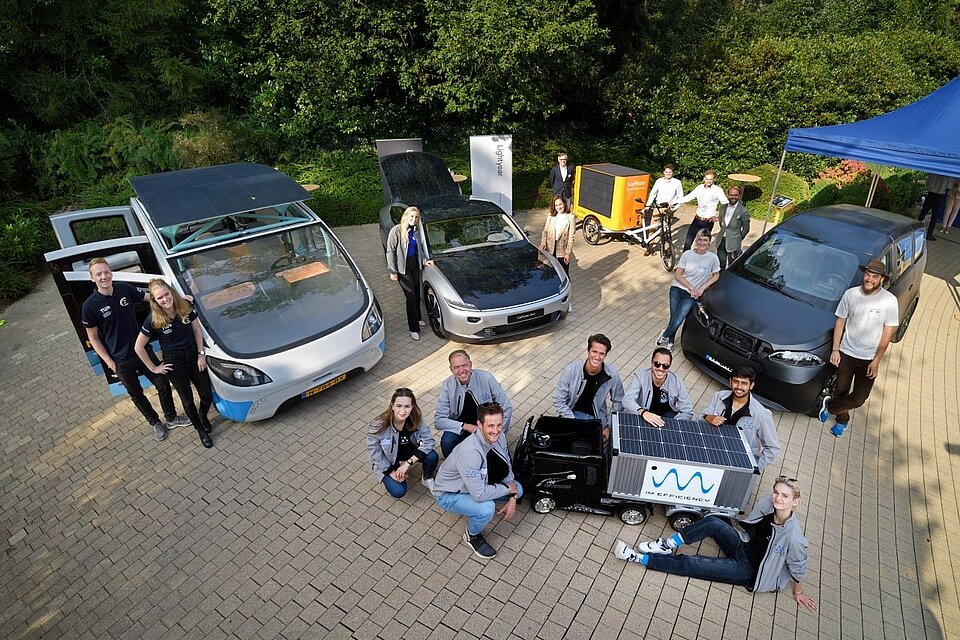IM Efficiency
‘It takes two hundred crazy people like us to solve the entire climate change problem.’

What does IM Efficiency do?
IM Efficiency has developed a technology for trucks to consume less fuel by generating solar energy aboard the truck. We have called this technology SolarOnTop.
SolarOnTop consists of flexible and thin but robust solar panels that are installed on top of a truck trailer. Under the trailer, we install an energy management system and a lithium-ion battery, which acts as a buffer between the solar panels and the energy management system. This system continuously monitors the status of the truck to assess whether it needs to be recharged to optimize fuel consumption. As a result, diesel trucks consume between five and six percent less fuel, which is a significant step forwards for the logistics sector. Aesthetics is not important, as the top of the trailer is not visible after all.
When talking about hybrid trucks (battery-electric or hydrogen-electric), SolarOnTop acts as a range extender. Allowing you to drive more kilometers using the energy generated by your own truck. Today, some twenty trucks in Europe are equipped with our technology.
Bus companies are also interested in our technology. This kind of transportation, and especially intercity busses, uses a lot of electricity; people charge their phones aboard, and also the air conditioning is a big electricity consumer. Today, that energy is still being generated by the diesel engine, which is inefficient, expensive and causes quite some pollution. The sooner we switch to sustainable energy the better.
Who are you and what is your role within IM Efficiency?
My name is Martijn Ildiz. I was not born in Brabant, but I studied International Business Administration in Tilburg. After my graduation, about seven years ago, I founded IM Efficiency. I am the CEO of the company, which effectively means that I am involved in all parts of the business. Some days I am driving a truck or I am lying under it, others I am working on electronics and programming, or I am talking to investors and customers.
My name is Ruud Derks and I was born and raised in Asten. After I graduated in Mechanical Engineering at the TU Delft, I mainly worked for Philips and DSM, including seven years in China for DSM. I also spent a lot of time in India and Africa. Eventually I ended up in Heerlen where I have been living for twenty-five years now. I am the CSO of IM Efficiency. I focus, among others, on strategy, finance and supply chain. We are a small company, meaning that everything that comes our way has to be dealt with at some point.


In what way are you helping to solve the global challenges?
We are trying to make a highly polluting sector more sustainable by fully focusing on sustainability and fuel savings. We are looking at how to incorporate the trailer in the overall energy management of vehicle combinations. The truck and trailer are coupled when driving on the public road, so you really have to look at the combination of these two vehicles to determine how to save energy. By focusing on the trailer, and researching how to incorporate this trailer into the overall energy management, we can accelerate the transition towards zero-emission vehicles.
Road transport will become more efficient if electric trucks are charged en route by a solar trailer. This way, we are making a major contribution to the energy transition and to reducing the greenhouse gas pollution, knowing that transport is responsible for some 7% of all greenhouse gas emissions. That is a big step. I always say that ‘it takes two hundred crazy people like us to solve the entire climate change problem'. Our technology is even included in the Urgenda plan, which contains sixty measures with which we - if we were to implement them now – would immediately realize the climate objectives for the Netherlands.
In addition, we are also consciously working on diversity. Our employees and interns come from Latvia, Russia, Lithuania, India and Sudan. This is how we try to bring people together. Every Wednesday afternoon we catch up and exchange ideas. For example, someone tells us about his or her research and we ask about someone's background.
What impact will you have achieved by 2030?
By 2030, every trailer that is bought or build will be equipped with solar panels. The technology is constantly being improved and it is nonsense to drive around with such a large surface area without using that area for solar panels. And our technology is perfect for such usage. Of course, it can also be used for other means of transportation, such as trains. Especially for the long routes, such as the train route between China and Tilburg. For the refrigerated section alone, the diesel has to be replenished twice a week. The use of solar panels allows for the optimization of this process.
We, together with Bonna Newman of TNO and LightYear, among others, have started a unique partnership; ASOM.solar. We are working together with large international companies, organizations and research institutes to develop solar powered solutions to enable efficient, easy and environmentally friendly transport. It is our mission to put forward how much misery we can solve and prevent by using solar energy where possible.
"We are working together with large international companies, organizations and research institutes to develop solar powered solutions to enable efficient, easy and environmentally friendly transport."
What party do you want to jointly realize this ambition with?
Unilever is a company with a good reputation for sustainability. It would be great if they would call upon their transport operators to cooperate in optimizing sustainable road transport. In addition, they could look into the possibilities of trailers equipped with SolarOnTop when parked at a distribution center. How can the excess energy generated by the solar panels on top of the trailer be used for the energy supply of the distribution center? That is technically feasible, so it is important that parties work together and know where to find one another.
Another sector which could greatly benefit from our technology is the flower sector. Flowers need to be refrigerated when transported over long distances on the European continent. Hence, a perfect combination to use our energy management system and realize an enormous reduction in fuel consumption.
What do you hope the Brainport region has accomplished in 2030 regarding innovation and sustainability?
It would be great if we could not only state that we are the smartest region in terms of innovation and sustainability, but actually deliver on that statement. We still have a long way to go to achieve that. Take the Arnhem region for example. They are currently doing considerably more in the area of sustainable energy than we are. Energy is a growth market and problems need to be overcome. Of course, we can export the knowledge gained, but we must also deploy it within the region. I often see the smart things that have been developed here being used at other locations.
And since we are dreaming up the future, it would of course be fantastic if SolarOnTop could be integrated into DAF's production lines. With a solar park and an accompanying hydrogen plant on site.
It will help if the Brainport Region fully focuses on the SDGs. It will stimulate all parties to think about the goals we have set ourselves.
Source: Timeframe Project Eindhoven